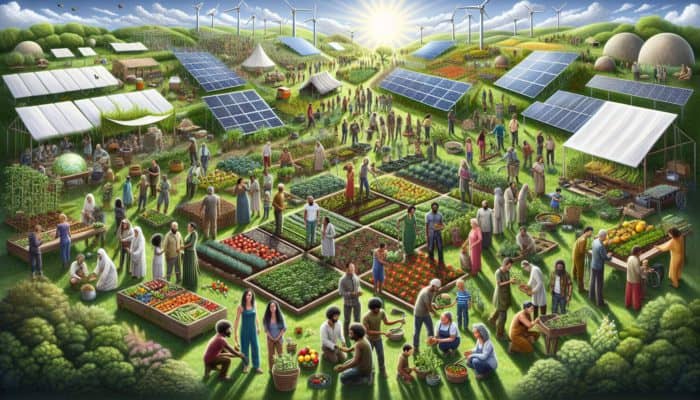Effective Strategies for Preparing for Grid-Down Scenarios
Building a Comprehensive Stockpile of Essential Supplies

Grid-Down Survival: To thrive during a grid-down scenario, building a comprehensive stockpile of essential supplies is crucial for your survival and that of your family during prolonged power outages. The strategy involves gathering a diverse assortment of items that meet fundamental needs such as food, water, medical supplies, and sanitation products. The objective is to create a stockpile capable of sustaining your household for weeks, or even months, depending on the severity of the crisis. Begin by collecting non-perishable food items that require minimal preparation, ensuring you have a varied diet. For hydration, it’s crucial to have a sufficient supply of clean drinking water or methods to purify water from alternative sources, such as natural bodies of water.
Essential items to include in your stockpile are:
- Non-perishable food (canned goods, dried fruits, grains)
- Water (at least one gallon per person per day)
- Medical supplies (first aid kits, prescription medications)
- Hygiene items (soap, toothpaste, feminine products)
- Cooking supplies (camp stove, fuel, utensils)
- Flashlights and batteries
- Warm clothing and blankets
- Manual can opener
Beyond these fundamental supplies, it is important to consider the unique needs of your family members, including pets. The goal is to reduce reliance on external resources, which may be scarce or unavailable during a grid-down event. Regularly check and rotate your supplies to maintain freshness and ensure you are always prepared.
Creating an Effective Communication Plan for Emergencies
Establishing a communication plan is essential in grid-down scenarios, particularly when traditional communication networks may be disrupted. With the right strategies in place, you can maintain contact with family and community members, ensuring safety and coordination during times of crisis. Begin by discussing the importance of staying connected and outlining alternative communication methods that will serve you well in emergencies.
Options like two-way radios or satellite phones can provide robust alternatives, particularly in remote areas where cell phone signals may be unreliable. Establish predetermined meeting points and clear communication protocols to ensure everyone understands how to reconnect in the event of separation.
An effective communication plan might include:
- Two-way radios with sufficient battery life
- Satellite phones for long-distance communication
- Signal flares or whistles for attracting attention
- A written list of essential contacts and meeting points
Engaging in community discussions about shared communication resources can further enhance your safety. By outlining clear procedures and ensuring everyone possesses the necessary tools, you can significantly improve your chances of maintaining contact during a crisis.
Strategies for Securing Alternative Energy Sources
When the power grid is down, securing alternative energy sources becomes a top priority. By harnessing renewable energy, you can maintain power for essential functions such as lighting, heating, and cooking, thereby increasing your self-sufficiency and reducing your reliance on external sources. Various options are available to ensure you have access to power during grid failures.
Solar panels present a viable solution, allowing you to harness the sun’s energy for electricity. They can be particularly effective in sunny regions and can be used to charge batteries that power appliances when needed. Additionally, portable generators can provide temporary power, especially for critical devices. Wind turbines are another alternative, particularly in areas with consistent wind speeds.
Consider investing in the following alternative energy sources:
- Solar panels with battery storage
- Portable generators (gas or propane)
- Wind turbines for off-grid energy
- Micro-hydro generators for running water sources
Investing in alternative energy sources not only enhances your resilience during emergencies but also promotes sustainable living practices for the long term. Before implementing any solutions, assess your energy needs and evaluate the feasibility of various options in your local environment.
Insights from Experts on Surviving Grid-Down Situations

Understanding the Far-Reaching Impact of Grid Failure
The impact of a grid failure extends far beyond mere inconveniences; it can fundamentally alter daily life. Prolonged power outages can lead to substantial challenges in accessing food, clean water, and medical care. Historical examples underscore the chaotic consequences of such failures. For instance, during the 2003 blackout in the Northeastern United States, millions were left without power for several days, resulting in confusion, scarcity, and significant economic loss.
Understanding the societal implications of a grid-down scenario is vital. Communities can face escalating tensions as resources dwindle, leading to disputes over essential resources such as food and water. On a personal level, individuals may experience heightened anxiety and stress, particularly if they lack preparation. The loss of communication infrastructure can further exacerbate feelings of isolation and helplessness.
By grasping these realities, you can better appreciate the necessity of preparation. Prioritising stockpiling, energy solutions, and communication methods can help mitigate the effects of a grid failure. Moreover, fostering community relationships can significantly enhance resilience. By working together, communities can share resources, skills, and mutual support during challenging times.
Developing Essential Skills for Survival
Equipping yourself with essential survival skills is fundamental to navigating a grid-down event successfully. These skills not only bolster your confidence but also significantly enhance your chances of thriving in the face of adversity. First aid knowledge is paramount; understanding how to treat wounds, perform CPR, or manage common ailments can save lives. Numerous online courses and local certifications are available to help you gain these essential skills.
Self-defense represents another critical area to consider. In uncertain conditions, personal safety becomes a priority. Seeking training in self-defense techniques can empower you to protect yourself and your loved ones against potential threats. Additionally, basic mechanical skills can prove invaluable. Understanding how to repair simple machinery or make basic fixes can ensure that you maintain vital equipment when needed.
Consider developing the following skills:
- First aid and CPR certification
- Basic self-defense training
- Mechanical skills for equipment repair
- Gardening and food preservation techniques
Integrating these skills into your daily routine can significantly enhance your preparedness. Regularly practicing first aid, joining self-defense classes, and engaging in community gardening projects can all contribute to your survival readiness.
Implementing Long-Term Planning and Preparedness

Achieving long-term survival in a grid-down scenario necessitates a comprehensive plan that considers food production, resource management, and community collaboration. Sustainable living strategies can significantly enhance your ability to thrive during extended power outages. Initiating food production through gardening or small-scale farming can ensure a steady supply of fresh produce. Learning about permaculture techniques can further enhance your ability to grow food efficiently and sustainably.
Community building is another essential element of long-term planning. Establishing a network of like-minded individuals can foster collaboration, resource sharing, and skill development. Consider organizing local meet-ups, workshops, or community gardens to strengthen bonds and create a supportive network.
Key components of a long-term survival plan include:
- Developing home gardens for food production
- Participating in local cooperative efforts
- Establishing a barter network for resource sharing
- Investing in renewable energy solutions
Long-term planning requires commitment and foresight. Continuously reassess and adapt your strategies as circumstances change, ensuring you remain prepared for any eventuality.
How Can You Maintain Hygiene During a Grid-Down Event?
Effective Water Conservation Techniques
Maintaining hygiene during a grid-down event is critical for health and morale. Water conservation techniques are paramount, as access to clean water may be limited. Adopting simple practices can help you manage your water resources effectively. For instance, consider implementing bucket baths instead of traditional showers. Using a small amount of water for washing can significantly extend your supply.
Additionally, composting toilets offer an eco-friendly solution for waste management. These systems use minimal to no water, thereby reducing overall consumption while providing a hygienic method for disposing of waste. Exploring options for water collection, such as rainwater harvesting, ensures you have a backup source during dry spells.
Effective water conservation methods include:
- Bucket baths for personal hygiene
- Composting toilets for waste management
- Rainwater collection systems
- Using wet wipes or biodegradable wipes
By prioritising water conservation and sanitation, you can maintain hygiene and well-being during a grid-down situation. Educating yourself and your family on these practices fosters a proactive approach to personal care.
Practising Sanitation Without Electricity
Learning to maintain cleanliness during a grid-down event without the convenience of modern sanitation systems is essential. While it may seem daunting, employing traditional methods can ensure you remain hygienic. Emphasize the use of biodegradable products and natural alternatives to chemical-based cleaners. For personal hygiene, consider using soap and water from stored supplies, and utilize the sun’s heat to dry clothes naturally.
In the absence of electric-powered appliances, manual methods become vital. Hand washing clothes can be accomplished using a bucket or basin, while air-drying offers an energy-efficient solution. Utilize natural resources, such as vinegar and baking soda, for cleaning and disinfecting surfaces.
Key strategies for sanitation include:
- Using biodegradable soaps and cleaners
- Hand washing clothes with manual methods
- Employing natural disinfectants like vinegar
- Air-drying clothes to conserve energy
Staying vigilant about sanitation is crucial for preventing illness. Implementing simple, resourceful techniques can go a long way in maintaining hygiene and health.
Implementing Waste Management Strategies
Developing effective waste management strategies is essential during grid-down scenarios to prevent health hazards. With limited access to traditional disposal methods, you’ll need to rely on creative solutions. Start by designating specific areas for waste disposal, separating organic waste from recyclables. Composting organic waste reduces the volume of garbage while creating nutrient-rich soil for your garden.
Educating your household on waste disposal guidelines is vital. Instruct family members on how to manage waste correctly, including storing hazardous materials safely and minimising waste production. Additionally, consider using sealed containers for waste storage to deter pests and odours.
Strategies for waste management may include:
- Designating waste disposal areas in your yard
- Composting organic materials
- Using sealed containers to store hazardous waste
- Implementing recycling practices to reduce overall waste
By prioritising effective waste management, you can maintain a cleaner, healthier living environment even during challenging circumstances. Education and community collaboration play essential roles in fostering a culture of cleanliness and resourcefulness.
What Are the Psychological Effects of Grid-Down Situations?
Strategies for Coping with Stress and Anxiety
Understanding the psychological effects of grid-down situations can help you proactively manage mental health challenges that arise. Prolonged outages often lead to heightened stress and anxiety as individuals grapple with uncertainty and resource scarcity. Recognising these feelings is the first step in building coping strategies to mitigate their impact.
Practice mindfulness techniques such as deep breathing, meditation, or journaling to help manage anxiety. Engaging in physical activities can also reduce stress levels, as exercise releases endorphins that promote a sense of well-being. Connecting with community members can foster a support network, allowing you to share experiences and coping methods.
Effective coping strategies include:
- Practising mindfulness and meditation
- Engaging in regular physical exercise
- Maintaining open communication with family and friends
- Setting achievable daily goals to instill a sense of purpose
By prioritising mental health and well-being, you can navigate the psychological challenges associated with grid-down scenarios more effectively. Establishing a routine and actively seeking out supportive relationships can create a foundation for resilience.
Techniques for Maintaining Morale and Hope
Maintaining high spirits during a grid-down situation is crucial for overcoming challenges. Learning techniques for maintaining morale and hope can bolster the mental resilience necessary to cope with adversity. Fostering a positive mindset begins with acknowledging the situation while focusing on solutions rather than problems.
Encourage family members to participate in activities that bring joy, such as playing games, telling stories, or creating art. Establishing routines can bring order to chaotic circumstances and provide a sense of normalcy. Participating in community events or resource exchanges can build camaraderie and reinforce collective hope.
Techniques to maintain morale may include:
- Engaging in enjoyable family activities
- Establishing daily routines for stability
- Participating in community gatherings or exchanges
- Setting collective goals to foster teamwork
By nurturing hope and fostering a sense of community, you can help mitigate feelings of despair and isolation. A positive outlook can significantly influence your ability to navigate the difficulties associated with grid-down scenarios.
Strategies for Dealing with Isolation and Loneliness
Isolation and loneliness can pose significant challenges during grid-down situations, especially if communication networks are down. Developing strategies to combat these feelings is crucial for maintaining mental health. Building supportive networks within your community can create a sense of belonging, even during difficult times.
Consider organising community gatherings, workshops, or resource-sharing events. Establishing a network of neighbours can facilitate communication and foster collaboration. Engaging in group activities or projects can strengthen relationships, creating a support system to lean on as needed.
Strategies to combat isolation may include:
- Organising community gatherings or workshops
- Creating a neighbourhood communication network
- Participating in group activities to foster relationships
- Setting up regular check-ins with neighbours
By actively promoting connection and collaboration, you can reduce feelings of isolation and enhance overall well-being. Supporting one another through shared experiences helps build resilience and strengthen community ties.
Securing Your Home and Property Against Threats
Implementing Effective Physical Security Measures
Implementing effective physical security measures is vital in protecting your home during grid-down scenarios. A well-secured home deters intruders and safeguards your family and resources. Start by assessing vulnerabilities in your property and reinforcing entry points with robust locks, deadbolts, and security bars.
Consider installing surveillance cameras or motion lights that operate on battery power, which can enhance your security while conserving energy. Creating physical barriers, such as fences or gates, can deter trespassers and provide a sense of peace of mind.
Effective physical security measures include:
- Reinforcing doors and windows with locks and bars
- Installing battery-operated security cameras
- Using motion-activated lights for visibility
- Creating physical barriers (fences, gates) around your property
By being proactive and vigilant about security, you can enhance your safety and well-being during challenging times. Engaging in regular security audits and improvements ensures you remain prepared for potential threats to your home.
What Are the Best Practices for Home Defense?
Ensuring your home is safe during grid-down events requires knowledge of best practices for home defense and security. Develop a comprehensive strategy that encompasses preventive measures, situational awareness, and community support. Begin by establishing a home defense plan that outlines how your family will respond to perceived threats.
Training family members in self-defense techniques can increase confidence and preparedness. Additionally, creating a layered security approach, such as combining physical barriers with an alert system, enhances your overall defense strategy.
Consider these home defense tips:
- Establish a family defense plan with specific roles
- Train family members in basic self-defense techniques
- Create layers of security (locks, cameras, alarms)
- Stay aware of your surroundings and suspicious activity
By prioritising home defense and actively preparing your family, you can significantly increase your safety during grid-down scenarios. Establishing a culture of security awareness empowers everyone and prepares them effectively.
Strengthening Community Cooperation for Enhanced Safety
Engaging in community cooperation is vital for enhanced security and resource sharing during grid-down situations. A strong community network can provide backup support and foster collaboration among neighbours. Start by building relationships with your neighbours, sharing resources, skills, and information to strengthen overall community resilience.
Establish a mutual aid network that outlines how members can assist each other in times of need, such as caring for children, sharing food supplies, or providing security. Hosting regular meetings enables open communication and planning, ensuring everyone is aligned regarding safety protocols.
Key components of community cooperation include:
- Building relationships with neighbours for resource sharing
- Establishing mutual aid agreements for support
- Hosting regular community meetings for communication
- Creating a neighbourhood watch program for security
By fostering community connections and cooperation, you increase the safety of your area and create a unified front against potential threats. Amplifying the collective strength of your community enhances everyone’s chances of enduring challenging situations.
Developing Emergency Preparedness and Response Plans
Creating and practising emergency preparedness and response plans is essential for quick and effective action during grid-down events. A well-structured plan ensures that every family member knows their roles and responsibilities, promoting coordinated action. Begin by assessing potential risks in your area and developing plans for various scenarios, including natural disasters, civil unrest, or prolonged power outages.
Conduct regular drills that simulate emergencies, allowing family members to become comfortable with response protocols. Additionally, ensure that your plans are adaptable, as circumstances may change rapidly during crises.
Key elements of an effective emergency plan include:
- Assessing local risks and planning accordingly
- Assigning roles and responsibilities to family members
- Conducting regular emergency drills to practice responses
- Maintaining an adaptable plan that can evolve with your needs
By prioritising preparedness and planning, you enhance your overall safety and security during challenging times. Familiarity with your emergency strategies enables quick and efficient responses to threats, minimizing potential harm.
What Are the Key Elements of a Grid-Down Survival Kit?
Gathering Essential Tools and Equipment
Assembling a grid-down survival kit is crucial for ensuring you have the necessary tools and equipment during power outages. Start with multi-tools that combine several functions, such as cutting, screwing, and prying, making them invaluable in various situations. Flashlights with extra batteries are essential for visibility, while a portable phone charger can keep your devices operational.
Consider including additional items that support basic survival needs, such as fire-starting tools, rope, duct tape, and a first aid kit. Each item should be carefully chosen based on your specific situation and the potential challenges you might encounter during a grid-down event.
Key items for your survival kit include:
- Multi-tools for versatility
- Flashlights with extra batteries
- Portable phone charger
- Fire-starting tools (matches, lighters)
Regularly review and update your survival kit to ensure all items are functional and relevant to your situation. By preparing an effective kit, you can enhance your resilience and readiness for unexpected circumstances.
Stocking First Aid and Medical Supplies
A well-stocked first aid kit is an essential component of your grid-down survival kit. Preparing for potential medical emergencies ensures you can respond swiftly and effectively when access to professional medical care is unavailable. Start by including a variety of bandages, antiseptics, and sterile gauze for wound care.
Ensure you also have essential medications, such as over-the-counter pain relief and any prescription medications that family members may require. Consider adding extra items such as splints for fractures, tweezers for removing splinters, and a manual on basic first-aid procedures.
Important medical supplies to include are:
- Band-Aids and various sizes of sterile gauze
- Antiseptics (alcohol wipes, iodine)
- Over-the-counter pain relief medications
- Prescription medications for family members
Regularly check and replenish your medical supplies to ensure everything remains in good condition. An effective first aid kit can significantly enhance your ability to address health concerns during emergencies.
Implementing Food and Water Storage Solutions
In a grid-down situation, having reliable food and water storage solutions is crucial for sustaining yourself and your family. Focus on accumulating long-lasting, non-perishable food items that can endure prolonged periods without refrigeration. Examples include canned goods, dried beans, rice, and freeze-dried meals, which can provide vital nutrition during crises.
For water storage, consider using large, food-grade water containers designed for long-term storage. Aim to have at least one gallon of water per person per day, factoring in additional volumes for pets and cooking. Creating a plan for water purification methods, such as boiling or using water filters, can help ensure your water supply remains safe.
Key storage solutions include:
- Non-perishable food items (canned, dried, freeze-dried)
- Food-grade water containers for long-term storage
- Water purification methods (filters, boiling)
- Emergency food ration packs for quick access
Organizing your food and water supplies methodically will facilitate easy access during emergencies. By prioritising proper storage solutions, you enhance your overall preparedness for grid-down situations.
Ensuring Effective Communication and Information Devices
Including effective communication and information devices in your grid-down survival kit ensures that you remain connected and informed, even when networks are disrupted. Battery-powered or hand-crank radios are invaluable for receiving emergency broadcasts, keeping you updated on critical information. Always keep spare batteries on hand to power these devices.
Incorporate alternative communication options, such as whistle signals or written communication plans, to help relay messages when electronic devices are unavailable or fail. Additionally, consider compiling a physical emergency contact list, as memorising numbers can be challenging during stressful situations.
Essential communication devices to consider are:
- Battery-powered or hand-crank radios
- Spare batteries for communication devices
- Whistles for signalling
- A physical emergency contact list
By preparing these communication tools, you enhance your ability to stay informed and connected during power outages or other grid-down scenarios. Having a reliable means of communication can significantly impact your safety and overall survival.
Personal Protection and Security Measures to Consider
Ensuring personal protection and security measures is crucial during grid-down events where resources may be scarce. Equip your survival kit with items that enhance your safety, such as whistles for signalling distress or pepper spray for personal defence. Establishing a home security plan helps deter potential threats and keeps your family safe.
Consider including items like a sturdy flashlight for visibility and deterrence, as well as a personal alarm that can alert others to your location. Additionally, create a plan detailing how to secure your home and property, focusing on reinforcing doors and windows and establishing communication protocols.
Key personal protection measures include:
- Whistles for distress signalling
- Pepper spray for self-defence
- Sturdy flashlight for visibility
- Personal alarms for alerting others
Taking steps to enhance your personal safety and security significantly increases your resilience during grid-down situations. Regularly review your protection measures to ensure they align with your needs and circumstances.
Proven Strategies for Grid-Down Survival
Establishing a Sustainable Food Supply
Establishing a sustainable food supply is foundational for your survival during grid-down scenarios. Learning how to grow and preserve food ensures access to essential nutrition while reducing reliance on external resources. Begin by cultivating a garden that focuses on high-yield crops adapted to your local climate. Incorporating permaculture principles enhances your growing practices, allowing for efficient use of space and resources.
Consider integrating preservation techniques, such as canning, dehydrating, or fermenting, to extend the shelf life of your produce. By mastering these methods, you can maintain a continuous supply of food even when fresh options are limited.
Effective strategies for sustainable food production include:
- Starting a vegetable garden suited to your climate
- Using permaculture principles to maximize resource use
- Incorporating preservation techniques (canning, dehydrating)
- Joining local community gardens for shared resources
Investing time in learning about sustainable food practices can empower you to create a reliable food supply. Regularly educate yourself on new techniques and share knowledge within your community to foster collective resilience.
Exploring Alternative Transportation Methods
In grid-down scenarios, traditional transportation methods may become limited. Exploring alternative transportation methods can significantly enhance your mobility when fuel is scarce. Bicycles are an excellent option, as they require no fuel and can cover considerable distances quickly. Investing in a sturdy bike with a repair kit ensures that you remain mobile and can transport essential supplies with ease.
Walking is another viable option, but it’s essential to plan routes that consider safety and accessibility. Encourage family members to maintain physical fitness to increase their ability to travel long distances if necessary.
Key alternative transportation methods include:
- Bicycles for fuel-free travel
- Walking as an accessible option
- Skateboards or rollerblades for shorter distances
- Horseback riding, if possible and safe
Adopting alternative transportation methods reinforces your self-sufficiency and adaptability during grid-down scenarios. Regularly practice and familiarise yourself with your chosen methods to enhance your skills and preparedness.
How Can You Establish a Barter System Effectively?
Developing a barter system is an effective way to trade goods and services during power outages or grid-down situations. Establishing this system early on fosters community relationships and enhances resource sharing. Start by assessing the skills and resources available within your community, creating a platform for exchange.
Promote a culture of barter by organising local events where individuals can trade goods or services. Create a community bulletin board or online platform where offers and requests can be posted, simplifying the process for everyone involved.
Key components of an effective barter system include:
- Assessing local skills and resources for exchange
- Organising local barter events for trading
- Creating a community bulletin board for offers
- Establishing clear communication channels for negotiations
By prioritising a barter system, you enhance community resilience and adaptability during challenging times. Engaging in these exchanges fosters cooperation and collaboration, reinforcing social ties that are vital during grid-down scenarios.
Strategies for Securing Water Sources and Purification
Identifying and implementing methods for securing water sources and purification is crucial during grid-down scenarios. Water is a fundamental necessity for survival, and knowing how to locate and secure it can make a significant difference in one’s well-being. Begin by identifying nearby natural water sources, such as rivers, lakes, or streams, that can serve as potential sources of water.
Once you have located a water source, it’s crucial to implement purification methods to ensure its safety. Boiling water is one of the most effective techniques, as it kills harmful pathogens. Additionally, using water filters or purification tablets can provide an alternative means of ensuring safe drinking water.
Effective strategies for securing and purifying water include:
- Identifying nearby natural water sources
- Boiling water to kill pathogens
- Using filters for additional purification
- Implementing rainwater harvesting systems
By prioritising water security and purification measures, you can enhance your resilience and well-being during grid-down events. Regularly assess your water sources and purification methods to adapt to changing circumstances.
Maintaining Essential Services During Grid-Down Events
Providing Emergency Medical Care
Understanding how to provide emergency medical care is vital during grid-down scenarios when access to hospitals and clinics may be limited. Acquiring basic medical knowledge, such as wound care, CPR, and emergency response protocols, can significantly impact survival outcomes. Enrol in first aid and CPR courses to ensure you are prepared for various medical emergencies.
Create a well-stocked first aid kit and ensure all family members know how to use its contents. Familiarising yourself with basic medical procedures, such as immobilising fractures or managing allergic reactions, can save lives when professional help is unavailable.
Key components of emergency medical care include:
- Basic first aid knowledge and skills
- Creating a well-stocked first aid kit
- Familiarising yourself with emergency response protocols
- Enrolling in first aid and CPR courses
By prioritising emergency medical care training, you bolster your ability to respond effectively to health crises. Regularly review your skills and knowledge to ensure you’re prepared for any situation.
Encouraging Education and Skill Development
Continuing education and skill development during grid-down events is essential for maintaining knowledge and capabilities. With traditional educational systems disrupted, consider alternative methods for learning and teaching skills. Engage in community workshops where skills such as gardening, foraging, and mechanical repair can be shared and practiced.
Encouraging family learning sessions can foster knowledge transfer among household members. Focus on practical skills that are relevant to survival, ensuring everyone is prepared for various situations.
Key strategies for education and skill development include:
- Hosting community workshops for skill sharing
- Encouraging family learning sessions
- Focusing on practical survival skills
- Utilising online resources when available
By prioritising continuous education and skill development, you can ensure preparedness for various challenges. Remaining adaptable and committed to learning fosters resilience during grid-down scenarios.
Establishing Community Governance and Decision-Making
Establishing a system for community governance and decision-making is crucial during grid-down events. A fair and effective governance structure ensures that resources are allocated responsibly and that community needs are met. Begin by organising community meetings to discuss shared concerns and priorities, allowing everyone to voice their opinions and ideas.
Implementing a decision-making framework can enhance collaboration and foster trust among community members. Consider creating committees that focus on specific areas, such as resource management, security, and communication. This approach ensures that each aspect of community survival is addressed effectively.
Key components of community governance include:
- Organising community meetings for open discussion
- Implementing a decision-making framework for collaboration
- Creating committees for specific areas of focus
- Fostering trust and transparency among community members
By prioritising community governance, you enhance the resilience and adaptability of your neighbourhood during grid-down scenarios. Encouraging active participation ensures that everyone’s voice is heard and contributes to a thriving community.
Frequently Asked Questions (FAQs)
What should I include in my grid-down survival kit?
Your survival kit should include essential tools, first aid supplies, non-perishable food, water storage, and communication devices. Regularly check to ensure all items remain functional and relevant.
How can I ensure my family is prepared for emergencies?
Discuss emergency plans with your family, assign roles, and conduct regular drills to practice responses. Education on first aid and survival skills is also crucial.
What are the best sources of alternative energy during grid failures?
Solar panels, wind turbines, and portable generators are excellent sources of alternative energy. Assess your environment to determine the most suitable option for your needs.
How can I deal with stress during grid-down situations?
Practice mindfulness, engage in physical activities, and maintain communication with family and friends. Establishing routines can also help provide stability.
What are effective waste management strategies during outages?
Implement composting for organic waste, designate disposal areas, and use sealed containers for hazardous materials to maintain hygiene and prevent health hazards.
How can I maintain personal hygiene without electricity?
Use bucket baths for washing, consider composting toilets, and utilise biodegradable wipes. Keeping a limited water supply for washing will be essential.
How do I find and purify water in emergencies?
Locate natural water sources and purify them through boiling, filtration, or chemical treatments. Rainwater collection systems can also provide additional water supplies.
What skills should I prioritise for survival?
Focus on first aid, self-defense, basic mechanics, and food gardening. These skills enhance your ability to cope during emergencies and contribute to self-sufficiency.
How can I foster community support during crises?
Build relationships with neighbours, establish mutual aid networks, and organise community events to discuss resources and strategies for collaboration.
What are the key elements of a sustainable food supply?
Start a vegetable garden, incorporate preservation techniques, and engage in community gardening projects to ensure a reliable and sustainable food source.
Explore our journey on X!
Surviving Without Fuel: Essential Strategies
Exploring the Fundamentals of Fuel-Free Living What Is the Concept of Living Without Fuel? Surviving Without Fuel: The concept of living without fuel centers on the pivotal goal of significantly reducing or entirely eliminating our dependence on conventional energy sources, such as gasoline and diesel. This lifestyle choice underscores the importance of adopting sustainable alternatives […]
Prepper Relocation Guide: Universal Strategies
Crucial Factors to Consider When Relocating for Preparedness Key Influences on Relocation Choices Prepper Relocation Guide: When contemplating a relocation for preparedness, it is essential to conduct a detailed assessment of various personal and situational elements. One of the primary considerations is to evaluate individual needs and preferences. These can encompass factors such as family […]
Prepper Community Tips: Essential Strategies for Preparedness
Establishing a Resilient Prepper Network for Effective Collaboration How Can You Evaluate the Trustworthiness of Potential Prepper Allies? Prepper Community Tips: Establishing a network of trustworthy preppers is paramount for building a reliable community. The cornerstone of any robust prepper group is trust, which is nurtured through consistent actions and demonstrated levels of preparedness. Engaging […]
Homemade Survival Gear: Essential DIY Tools
Must-Have DIY Survival Tools for Every Adventurer Effective Water Purification Techniques for Survival Homemade Survival Gear: Purifying water is a crucial skill that ensures access to safe drinking water in survival situations. By employing simple household items, you can effectively eliminate harmful bacteria and contaminants, making water safe for consumption. One of the most reliable […]






